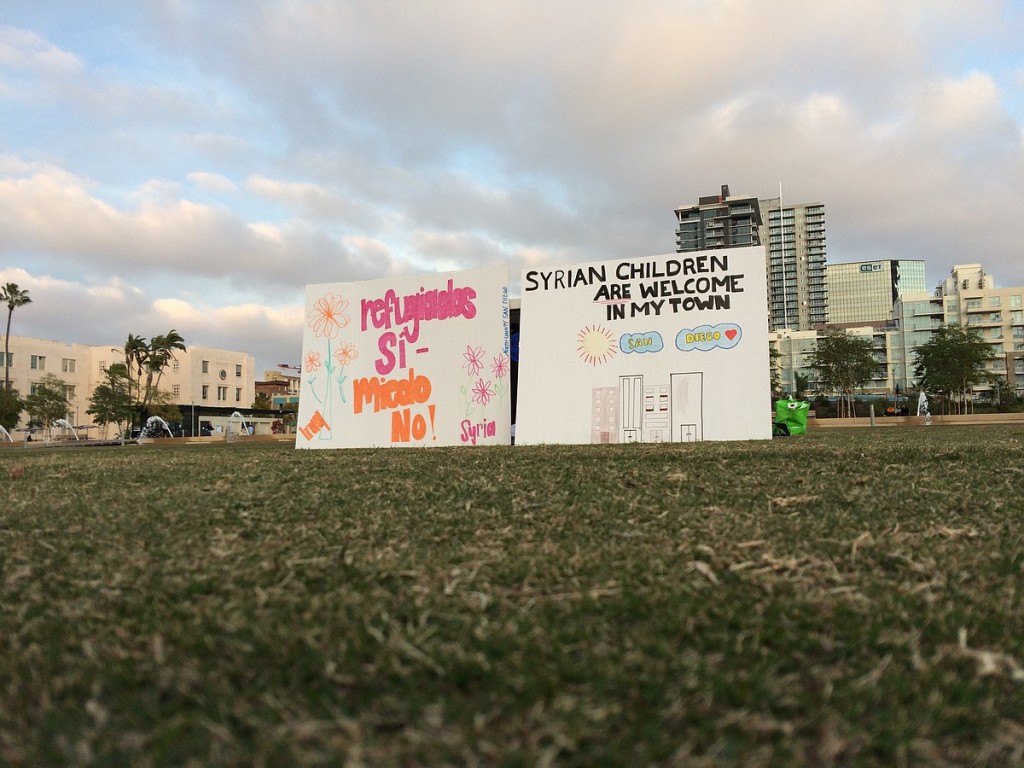Human Rights Day was Thursday, and hundreds of San Diegans seized the opportunity to draw attention to the contributions and needs of refugees in the region.
The Partnership for the Advancement of New Americans organized a 5 p.m. rally at the County Administration Center Waterfront Park “to stand up against hateful rhetoric, and to ask our public officials to take responsible action to welcome refugees,” the group’s Facebook invitation says.
“I think they should know that San Diego is a refugee city. We’ve resettled over 78,000 people since the early ’70s and they are a part of our community,” said Ramla Sahid, executive director of the partnership.
“People should understand when we have hate speech, talk about banning Muslims — it really re-traumatizes people because that’s the same kind of rhetoric people left behind.”
Human Rights Day is an international observance of a 1948 United Nations declaration that was the first to identify fundamental rights all nations should protect. The articles include the right to “seek and to enjoy in other countries asylum from persecution” and access to economic and social resources to maintain one’s dignity and a minimum standard of living.
Organizers want to remind elected officials and their neighbors of such principles at a time when nations are moving to restrict refugees, and anti-migrant rhetoric takes center stage in the press.
RELATED: San Diego Arts Nonprofit To Confront Migrant Debate With Airport Mural
GOP presidential hopeful Donald Trump made headlines earlier this week when he said he wants to ban Muslims from entering the United States. The comment — along with a House resolution to tighten restrictions on refugees and statements from several governors who want to ban Syrian refugees from settling in their states — stems from concerns attackers in San Bernardino and Paris may have taken advantage of policies meant to help refugees and immigrants.
Suspects in the Nov. 13 Paris massacre travelled freely between Belgium and France. Though unconfirmed, many believe at least one of the attackers came into the European Union disguised as a Syrian asylum-seeker.
And this week the FBI revealed one of the shooters in the San Bernardino terrorist attack that killed 14, Tashfeen Malik, came to the United States on a fiancé visa, after she had been radicalized, and may have lied on her entry papers.
San Diego became a refugee hub following the resettlement of tens of thousands of Vietnamese refugees following the fall of Saigon. Today the San Diego region resettles about 3,000 refugees a year, according to state data, and it’s expected to welcome a few hundred Syrian refugees next year.
Recently, many of the refugees arriving here come from Iraq and settle in El Cajon, where there’s an established Iraqi community because of an earlier group of people who fled the Gulf War.
County Supervisor Dianne Jacob represents El Cajon and other parts of East County. In a statement to KPBS she cautioned taking any more refugees.
“The federal government has failed to address the impact and needs of thousands of refugees who have already been placed in our region, and I don’t feel any more confident about its ability to handle and vet additional refugees from war-torn areas,” the statement reads.
San Diego Mayor Kevin Faulconer did not respond to a request for comment. A spokesman for Supervisor Greg Cox, who represents San Diego at the county level, said he could not be reached because he was out of town for the California Coastal Commission meeting.
Gov. Jerry Brown said recently he wants refugees to be fully vetted, but would not block them from entering California and intends to “uphold America’s traditional role as a place of asylum,” he said in a November statement.
The Partnership for the Advancement of New Americans is a new nonprofit based in City Heights, where many refugees in San Diego settle. It aims to research the needs of refugee families, and nurture leaders and increase civic engagement in the refugee community.

